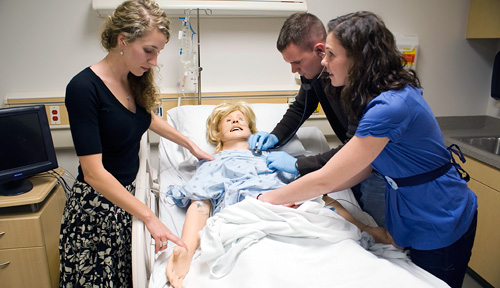A major educational goal of the College of Medicine is to provide medical students with the knowledge and skills they will need to function and learn in residency programs. Toward that end, there are educational programs which have been or will soon be implemented to improve our students’ education in clinical skills and health care quality improvement.
Clinical Skills
The College of Medicine has a list of required clinical skills for medical students. This list was compiled from a search of the medical literature and vetted by vote of College of Medicine faculty.
Student performance of many of these skills is assessed via observation by residents and faculty and via objective structured clinical examinations (OSCE). Students are required to demonstrate successful completion of these skills prior to graduation. Skills on the list range from interviewing/patient relationship skills to invasive procedures.
Instruction in and assessment of student clinical skills were greatly enhanced by the opening of the Sorrell Simulation Laboratory. This state-of-the-art facility provides simulated learning environments emulating outpatient clinics, intensive care areas, inpatient rooms and a soon-to-be-opened simulated operative care suite including a simulated operating room and pre and post op care areas.
The lab is home to a variety of high fidelity task trainers and mannequins which allow learners to practice many invasive procedures prior to performing those procedures on humans. The lab is equipped with video recording capabilities in all areas as well as mobile units which allow learners and instructors to view and assess learner performance on simulation exercises.
New simulation training programs include interprofessional team communication/cardiac arrest simulations for medical and nursing students and a computer-aided self-study course on point of care ultrasound for medical students.
The lab also employs a cast of very talented patient simulators who can assume patient roles for medical interview and examination exercises. The college is fortunate to have an exceptional and talented staff in the lab including Patti Carstens, Dan Brick, Jon Sample and Tom Birk, Ph.D.
Health care Quality Improvement
The United States ranks almost last among the world’s industrialized nations in health care quality and many patients suffer or die in our country due to our problems in health care quality.
The College of Medicine now has required health care quality curricula in all four years of medical school. During the first two years, students complete online coursework in quality.
These courses provide information about the basics of health care quality improvement, scope of the problem, and methods of quality improvement.
In their third year, medical students complete an individual or team-based quality improvement project during their eight-week preceptorship in family medicine.
During their fourth year, students work in teams of 3-4 investigating quality problems at The Nebraska Medical Center and presenting suggestions for correcting these problems. This seminar course is part of the M4 Integrated Clinical Experience (ICE) program.
Recently, the college committed to implementing the Institute for Healthcare Improvement (IHI) Open School Quality Improvement Course. This is the only nationally recognized health care quality improvement curriculum for health professions students.
Elements of this program have been used in the college’s curriculum for several years. The full curriculum will be phased in beginning with the incoming class to be seated this summer. Students can achieve an IHI certificate upon completion of all required elements of the Open School Course.
Instructional programs in both clinical skills and health care quality are designed to support the college’s mission of preparing students to enter and learn in medical residency programs.
